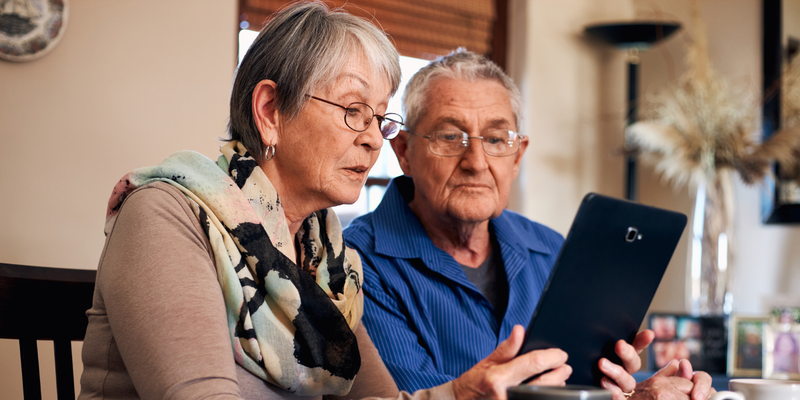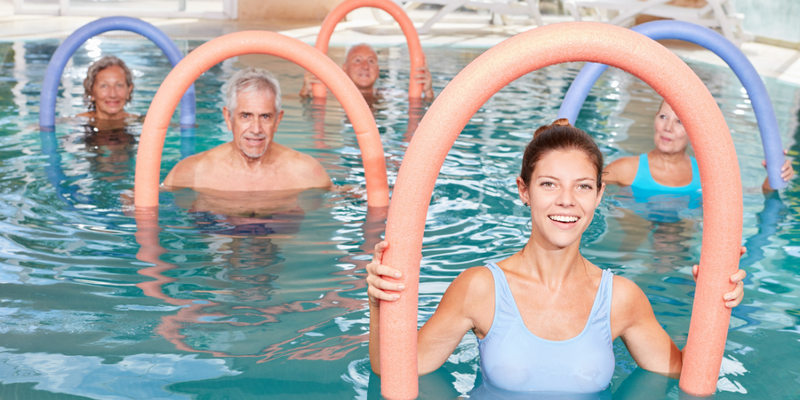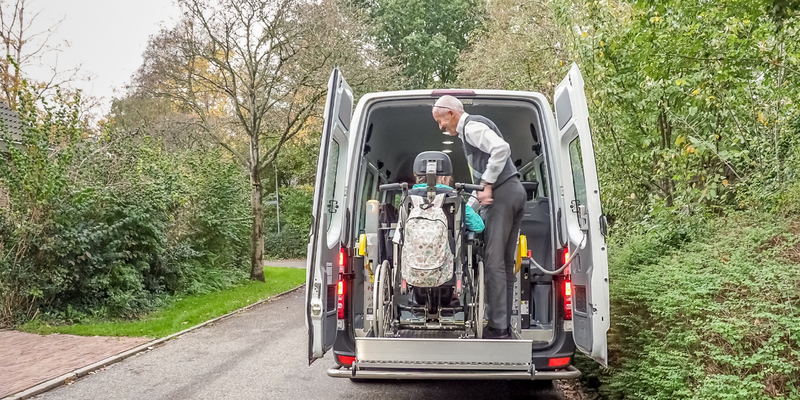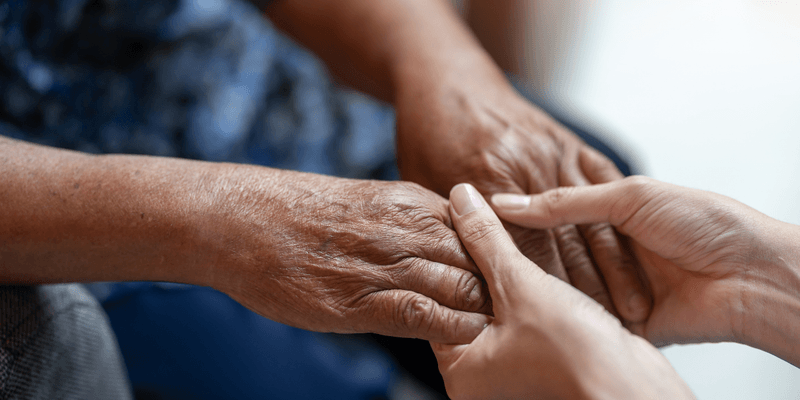As our loved one's age, there are many questions that need to be answered. One of the most important is where they will live as they age and progress in their need for care. While assisted living facilities and nursing homes certainly have their place, living at home is usually the number one choice for most seniors, but not always the easiest. That’s why assistance for keeping seniors living at home is available.
The vast majority of older adults—nearly 90% according to AARP—choose the option of living independently in their home or community. And for good reason! There are many benefits that come with staying in your own home as you age, including maintaining your independence, a lower cost of living, familiar settings and routines, and a healthier environment.
This is why CareLink is committed to helping seniors remain at home and independent for as long as possible. Read on to learn more about the benefits of living at home and how to find help for at-home seniors.
The Benefits of Living at Home for Seniors

Independence
Aging in place allows people to remain independent longer. Their own belongings surround them, can choose their own activities and when to have visitors over, and can eat what they see fit.
When people feel they have control over their life, they tend to remain healthy and happy for longer. Feeling out of control can lead to an elevated stress level, depression, anxiety, and loss of appetite.
Familiar Settings and Routines
Some seniors choose to stay at home because they are no longer able to work due to a lack of physical abilities whereas others have health issues that prevent them from continuing to work. Either way, aging is a big transition that comes with many changes. Living at home can provide a sense of security and comfort for seniors who feel vulnerable or uncertain about their future.
Many people love their homes and cherish the memories made in them. Living in familiar surroundings can help seniors feel secure and stable, which is especially important if they have been diagnosed with Alzheimer’s disease or another form of dementia. Setting up familiar routines in familiar surroundings lessens confusion, sparks memory, and reduces the likelihood of an outburst or anxiety attack.
Several studies have found that dementia patients have a better outcome when they are living at home. However, it works best when they are living at home from the start. Think of it as a form of preventative care.
Lower Cost of Living
Many seniors are on a fixed budget, so living at home is a very important benefit. Did you know that the cost of home assistance for the elderly is almost always lower than the cost of living in a nursing home or assisted living facility?
Of course, this depends on how much and what kind of care your loved one needs. But you can find assistance and resources for everything from occasional respite care to full-fledged, at-home personal care for your elderly loved one.
According to the U.S. Department of Housing and Urban Development, living at home can save you thousands of dollars per month. For example, the average monthly cost of a nursing home in Arkansas is over $5,000.
There are also programs for seniors available through your community, offered at a reduced cost or no cost at all to you. Contact CareLink for more information about the senior resources available in Central Arkansas.
Healthier Environment
Many people assume that a nursing home or assisted living facility is healthier because their loved one will be surrounded by medical staff and on a regular schedule.
But many studies have found that living at home for as long as possible is the healthier choice. For some seniors, moving to a nursing home can have a worse health outcome, even when they start in similar health.
Multiple factors affect this. One is the emotional toll that being away from home can have. When you’re homesick, your stress level rises, and you can be at a higher risk for depression and stress—both of which are associated with cognitive decline.
Another consideration is proximity to infection. In a nursing home, for example, you’re surrounded by other seniors with their own health difficulties—and the same personnel is caring for you. This is why nursing home residents have a much higher infection rate and incidence of pneumonia than seniors who live at home.
Aging in place improves the quality of your loved one’s life, which improves both their physical and mental health.
CareLink—Assistance for Keeping Seniors Living at Home
Now that you understand the many benefits of aging, the next question is: “How can I get the help I need to remain at home?”
Luckily, there are dozens of resources, programs, and services that can help you stay in your home. CareLink provides many community-based services and other types of assistance to keep seniors living at home, and also connects seniors to other programs and resources not directly offered by CareLink.
Read on to learn more about the services available to you in Central Arkansas through CareLink.

In-Home Assistance
Since 1979, CareLink has provided Central Arkansas with high-quality at-home care for seniors. We offer customized care plans designed to meet your loved one’s unique medical, emotional, and financial needs.
All care plans are created under the supervision of a licensed R.N. or qualified supervisor. We work directly with your loved one, their caretakers, and their medical team to build a comprehensive care plan.
After your care plan has been drawn up, it will be carried out by a trained at-home care attendant. Each of our aides passes extensive drug and background checks, including checks against the Child and Adult Maltreatment Registry.
What Services Does In-Home Assistance Provide?
In-home assistance is a personal care program. This means it provides non-medical care and support for your loved one in the comfort of their own home. Services vary depending on individual needs, but may include:
- Personal hygiene
- Housework
- Shopping
- Meal preparation
- Medication reminders
- Dressing
- Laundry
- Socialization
How Much Does In-Home Assistance Cost?
The cost of in-home assistance will vary depending on your personal situation. Medicare often covers at least part—if not all—of the costs for certain personal care services. If you are a veteran, the Department of Veterans Affairs (VA) also offers reimbursement programs for in-home care for seniors. You may also use private insurance to pay for part or all of your care.
If you’re not sure how you’d pay for in-home care, contact CareLink. Our Information & Assistance Specialists are happy to walk you through your options and help you apply for any financial assistance you may qualify for.
Meals on Wheels
One of the most important services CareLink offers seniors is our Meals on Wheels program. Nationally, Meals on Wheels serves over two million seniors. This program is one of the most important components of assistance available for keeping seniors living at home.
In Arkansas, CareLink provided 762,797 meals to seniors last year alone. This number does not include meals delivered by partner providers like senior centers and other organizations throughout our service area
The crisis of food insecurity in Arkansas is devastating for the senior population. Whether they can’t afford the food they need or have mobility issues that prevent them from getting to the grocery store, seniors are particularly vulnerable to food insecurity.
The Benefits of Meals on Wheels
The benefits of regular Meals on Wheels are well documented. Social interaction, physical activity, and mental stimulation are all proven to help prevent and manage Alzheimer’s disease, Parkinson’s disease, and the many other forms of dementia.
The program provides nutritional support and a home-cooked meal every day. It also helps seniors maintain their independence and continue living in their own homes as long as possible.
Mental Stimulation and Social Interaction
It’s a sad fact, but for many seniors, their Meals on Wheels delivery is the only social interaction they’ll have all day—and possibly all week. When you suffer from mobility issues, getting out to see friends or even just to walk the block and wave at neighbors becomes impossible. This can severely cut into your social life and cause isolation and depression. Socialization assistance is essential for keeping seniors mentally healthy while living at home.
Seeing a friendly face every day during meal drop-off can significantly lift an isolated senior’s spirits. Many of our delivery volunteers have special routes and “regulars” whom they see every day. They check in on their seniors, chat with them, and provide them with a nutritious hot meal.
This service can be a lifeline of support and care for homebound seniors. In fact, a recent study completed by Meals on Wheels America found that 92% of seniors believe the service allows them to stay in their homes.
Nutritious, Balanced Meals
Another enormous benefit of Meals on Wheels is, of course, the meal. Many homebound seniors have to live off frozen foods and TV dinners. While these are great in a pinch, they usually come with a high price tag health-wise. High in sodium, sugar, and fat, and low in fiber, nutrients, and minerals, frozen dinners are not a healthy, balanced meal.
Each Meals on Wheels menu is prepared by a registered dietician, provides one-third of the U.S. Recommended Daily Allowance (RDA), and complies with the Arkansas Division of Aging and Adult Services standards.
You can feel the difference when you’re eating something that nourishes your body. This is likely why 83% of seniors say Meals on Wheels improves their overall health.
And for those who are not housebound but suffer from food insecurity, please check out senior centers in your area. Many provide hot lunches for members at no cost.
How Much Does Meals on Wheels Cost?
Meals on Wheels is provided at no cost to all senior citizens who are 60 years or older. If you have the means, please consider donating, so we can continue to offer these vital services to homebound seniors in Central Arkansas.
Senior Centers
Because socialization assistance is so important to mental health and keeping our seniors living at home, check out the list below for more information on the senior center closest to you:
The Benefits of Senior Centers
It’s a given that as we age, our participation in daily activities gradually declines. Many of us experience physical limitations, and others simply grow out of the things they used to enjoy.
But while these changes might make some aspects of growing older challenging, they can also present opportunities. The right support system can make an older adult’s transition to retirement much easier. Senior centers, designed to accommodate the needs of older adults, play an important role in making this transition as comfortable as possible.
Those who visit their local senior center can enjoy many benefits, such as more autonomy and greater access to social and recreational services. What’s more, seniors who are part of a senior center community are more likely to stay healthy.
Active Living
One of the most obvious benefits of senior centers is their residents’ increased access to social engagement and active living opportunities. Those who regularly visit a senior center are more likely to participate in community events, such as monthly potlucks, art shows, and exercise classes. Many senior centers host on-site fitness, wellness, and enrichment programs that provide residents with affordable access to classes, activities, and resources that aren’t always available elsewhere.

Better Social Engagement
Another key benefit of senior centers is the ability to socialize with other visitors. Many seniors have difficulty making new friends due to physical limitations and the perception of financial barriers. The assistance of senior centers helps overcome these particular challenges and keeps seniors living longer at home.
Visitors to a senior center often have opportunities to interact with others who share similar experiences and interests. Many centers host regular social activities, such as coffee clubs, book clubs, and bingo games. Some centers even offer senior activities, such as vacations or cruises, which allow older adults to travel together while developing lasting friendships through shared experiences.
More Community Involvement
Enthusiastic involvement in the local community can be hard to come by in retirement. Most people don’t have the same kinds of connections they had while working. But the right senior center can help older adults revive their interest in civic life.
Many senior centers offer members the opportunity to volunteer their time at local schools, hospitals, and other organizations that help the elderly and disabled. Others offer classes on topics relating to local government, such as campaigning laws, public policy, or civics.
Improved Health and Safety
Senior centers also promote better health and safety. Receiving hot lunches, taking exercise classes, and socializing all improve both physical and mental health. And being part of a community increases safety. If you took a fall, for instance, and missed a class, your friends would likely notice and send someone to check on you. Keeping these ties to a community and the assistance provided by the centers will help keep seniors living at home.
Family Caregiver Support
A huge part of supporting seniors is providing care and support for their caregivers. Remember, if you’re not taking care of yourself, you won’t have the energy you need to care for others. To ensure that family caregivers have the support they need, CareLink offers both community and financial support.
Family Caregiver Support Groups
Caregiver support groups connect you with other caregivers in your area. Meetings are always offered at no cost and often provide respite care while you attend. Support groups offer advice and resources from people who are going through the exact same thing you are.
Find comfort and solace, vent your frustrations, and receive the advice you need from people who have done it before. CareLink can connect you with a support group in your area.
Family Caregiver Grant Program
Our grant program is administered by Alzheimer’s Arkansas. These grants are awarded to procure respite services for caregivers, so they can attend to their own lives.
The only eligibility requirement to apply for the grant is that the person receiving care must live in CareLink’s service area, be at least 60 years old, and have a chronic illness.
The Importance of Self-Care for Caregivers
If you’re a caregiver, the idea of taking care of yourself can be difficult. Self-care is something many people struggle with, but it seems to be especially challenging for caregivers.
Caregiving can be both emotionally and physically draining, which makes it difficult to prioritize your own needs. However, taking care of yourself is just as vital as taking care of others.
Self-care can reduce your risk of burnout, depression, and stress. It can also help you remain engaged with your loved ones and maintain your own sense of self.
To make it easier for caregivers to care for themselves, here are some ways to care for yourself to keep your own needs as important as your responsibilities.
Plan Your Day
To be a good caregiver, you have to take care of yourself first. Everything you do as a caregiver will affect your mood, your energy, and your overall health. Therefore, a huge part of self-care is taking time for yourself every day.
Set boundaries. If your responsibilities start to affect your mood and energy level, it can be a sign of impending burnout. You can help keep yourself from feeling overwhelmed by setting boundaries for when you will help your loved ones and when you will take care of yourself.
Don’t Multitask
Multitasking is a myth. There’s no proven benefit to doing many things simultaneously, and it can significantly reduce your energy and productivity. Simple tasks, such as cleaning your house or taking care of your loved ones, can be done with a single focus. The less you try to do at once, the better off you’ll be.
If you cannot manage your workload without multitasking, consider finding help. Either ask another family member or hire someone to take on some of the burdens of care
Try Breathing Exercises
Caring for others can cause you to feel overwhelmed, stressed, and anxious. While it’s natural to experience these emotions while caring for others, it’s important to remember that you don’t have to stay in that space. Learning to breathe through your emotions can help calm down and relieve your stress.
Try practicing a simple breathing exercise when you notice yourself becoming stressed out. When you notice yourself getting frustrated, upset, or angry, take a deep breath and acknowledge those feelings without judgment. Then let them pass.
This can help you stay in control of your emotions and prevent you from acting impulsively.
Take a Walk Outside
Sometimes the best way to relieve stress and relax is through physical activity. Walking can help clear your mind and relax you, especially when you do it outside. Getting fresh air, seeing the sights, and taking in nature can help you relax and work through your emotions.
Physical activity while outdoors can also help reduce anxiety. Many people with anxiety find it difficult to relax because they feel they don’t have control over their body. Physical activity can help you feel more in control of your body and emotions, which can help you relax faster and feel less anxious.

Eat Healthy Food
Eating healthy food is important for your mental and physical health. It also can help you stay energized and reduce your risk of depression and anxiety.
If you’re a caregiver, you probably don’t have much time for meal preparation. If so, don’t worry! Nutrient-dense foods are easy to prepare and can be eaten on the go with the right recipes and prep work. Look up “fast, healthy recipes” or “easy, healthy meal prep” for inspiration.
Get Enough Sleep
Sleep is crucial for your mental and physical health. As a caregiver, you’re likely to be rushed and tired. You may not have time for a regular bedtime, but it’s vital that you make time for sleep.
Not getting enough sleep can make you feel tired, stressed, and anxious. In addition, not getting enough sleep can negatively affect your memory, concentration, and psychological well-being.
Make sleep a priority. Make sure you allocate enough time for sleep—seven to eight hours a night for most adults.
Don’t Isolate Yourself
When you’re a caregiver, your life starts to revolve around the person for whom you’re caring. It’s like being a parent—but without the natural support of a school, partner, or other parents.
There will be times when you have to prioritize your loved one’s care, but make sure not to isolate yourself in the process. You need your friends, family members, and community as support now more than ever. When you isolate yourself, you cut yourself off from receiving the help you need.
Take time for activities that don’t involve your loved one or your responsibilities. You can read a book, watch a television show, go to a café, or do anything that doesn’t involve caring for someone else. Get out in the world and let yourself be a person. You’ll return renewed and full of energy for your loved one.
Making time for yourself can help you feel less overwhelmed and less stressed. It can also help you maintain your sense of self and priorities.
Network with Other Caregivers
Caregivers often feel like they’re all alone. You may feel like no one understands what you’re going through, or that you have to do this all on your own. That’s not true.
By connecting with other caregivers, you can feel less isolated. You can also learn from the experiences of others and find ideas and resources for self-care.
While caregiving can be emotionally draining, there are ways to care for yourself while caring for others. Taking breaks, eating healthy food, getting enough sleep, and staying connected with others can help you stay balanced while caring for others.
Bone Appétit
Our pets offer unconditional love, companionship, and endless amusement. For seniors—especially seniors who live alone—a pet can be a lifeline. Seniors with pets are less likely to feel isolated or suffer from symptoms of anxiety and depression. Pets can even lower your blood pressure, lessening your risk of a heart attack or stroke!
We believe that keeping pets with their elderly humans for as long as possible is essential to a senior’s quality of life. That’s why we created the Bone Appétit program.
Bone Appétit is a program that allows CareLink to ship to you the essentials needed to care for your pet and keep them safe. Currently, we can help provide pet food, collars, leashes, and name tags to seniors in Pulaski County. Eventually, we hope to add other items like veterinary services and expand the service throughout our service area.
How Much Does Bone Appétit Cost?
Bone Appétit is offered at no cost to you! It is fully funded through grants and donations. If you would like to make a donation and help a senior in Central Arkansas care for their pet, click here or call (501) 688-7446.
You must be 60 years or older and live in Pulaski County to qualify.
Transportation
It is critical for everyone, especially older adults to have access to transportation services in order to remain independent in their homes. Many senior citizens can no longer drive, or struggle with mobility issues. This can leave them homebound and unable to perform necessary errands, like going to the grocery store or attending medical appointments.

Transportation Resources in Central Arkansas
CareLink provides transportation to people aged 60 and older who live in the metro area. We have a non-emergency medical transportation program that focuses on providing transportation to medical appointments, as well as provide transportation to and from senior centers (that don’t have their own transportation program), pharmacies, grocery stores, and shopping centers. Stops vary depending on availability.
Please contact us at least 48 hours in advance to schedule trips for doctor’s appointments. Socialization and other non-medical related trips are scheduled day of based on driver availability. You should also let us know if you have any special needs or mobility issues as we have handi-capable vans for wheelchair transportation.
Call (501) 372-5300 for more information or to get your next trip scheduled.
Not For Medical Emergencies
Please note this is NOT an emergency transportation service. If you are experiencing a medical emergency, please call 911. They can send an ambulance with the equipment and trained medical professionals required.
Care Coordination Assistance for Keeping Seniors Living at Home
CareLink has qualified Care Coordinators to help you create and maintain a comprehensive care plan for your loved one.
They assess your physical, mental, and emotional status, and ensure that the services they recommend meet all your needs. They will help you get the correct benefits based on what's applicable to your situation.
The Care Coordinator also provides a single point of contact for any changes in care that you may need. Stop trying to keep track of everything yourself. From applying for benefits to ordering medical equipment, your Care Coordinator is here to help improve your quality of care and life.
How Much Does Care Coordination Cost?
Care coordination is offered at no cost to you. We will assess your physical, mental, emotional, and financial needs, and help you form a plan of action for addressing them.

What Does Care Coordination Include?
After your assessment is completed, your Care Coordinator will work to combine all the services you need to live a safe, healthy, and independent life. Services will vary depending on your needs, but they may include:
- Care planning and management
- General referral services
- Ordering medical supplies
- Application assistance
- Legal assistance
- Home-delivered meals
- Transportation
- Home care
The Benefits of Care Coordination for Seniors
If you’re looking for assistance in keeping seniors living at home, consider care coordination. As we age, our care becomes more complicated. Care coordination can help simplify the process and improve the quality of your care.
Keep Doctors Informed
Living with a complex medical condition often means having multiple doctors. The goal of care coordination is to keep all members of your health team informed and on track, which will help you avoid redundant testing, screening, and treatment. It also keeps them up-to-date on changes to your health, like new or worsening symptoms.
When your doctors work together, it improves your outcome and reduces your risk of complications.
Better Health Outcome
Studies suggest that professional care coordination results in a better health outcome. Patients are often more satisfied with the quality of their care when it has been personalized and tailored to their individual needs. Care coordination also focuses on social and emotional needs to achieve wellness for the patient's mind and body.
Relief for Caregivers
It can be hard to take care of your loved ones as they age. Professional care coordination for seniors relieves caregivers of many duties while keeping them updated on their loved one’s status and needs. This allows the caregiver more time to work, relax, and focus on their own family at home.
Medicare Counseling
CareLink's trained staff can help recipients evaluate their Medicare plan to ensure they get the best possible coverage at the best possible price to fit their medical needs.
Medicare is available for people age 65 or older and younger people with disabilities. Medicare has two parts, Part A (Hospital Insurance) and Part B (Medicare Insurance). To find out if you are eligible and your expected premium, go to the Medicare.gov eligibility tool.
Because health needs evolve over time and Medicare plans change annually, those receiving Medicare should reevaluate their plan each year to ensure they have the best coverage in place for their needs in the coming year. Contact us today to schedule your complimentary Medicare consultation.
Information and Assistance for Keeping Seniors Living at Home
If you have questions about the programs and resources available to you or your elderly loved one in the Central Arkansas area, contact CareLink today!
Our Information and Assistance Specialists will discuss your needs with you and either schedule an appointment with a Care Coordinator or connect you to the correct resources.
We’re here to help you discover all the programs and assistance for which you qualify— at no cost to you. Our goal is to help seniors in Central Arkansas live a happy, healthy, and independent life.
Just call us at (501) 372-5300 or toll-free at (800) 482-6359.
Need Assistance for Keeping Seniors Living at Home?
If you live in Central Arkansas and have questions about the senior services in your area, contact CareLink today! We’ll connect you with the resources you need to achieve a higher quality of care and a higher quality of life.
There are a lot of things that my father needs help with, and it’s quite helpful how you talked about how caregiving can help with that. Things like chores and meal preparation are quite difficult for him, and I really want to do what I can to make all of that as easy for him as possible. Once I find an in-home caregiver service for him, I’ll definitely get them to sign up with us.